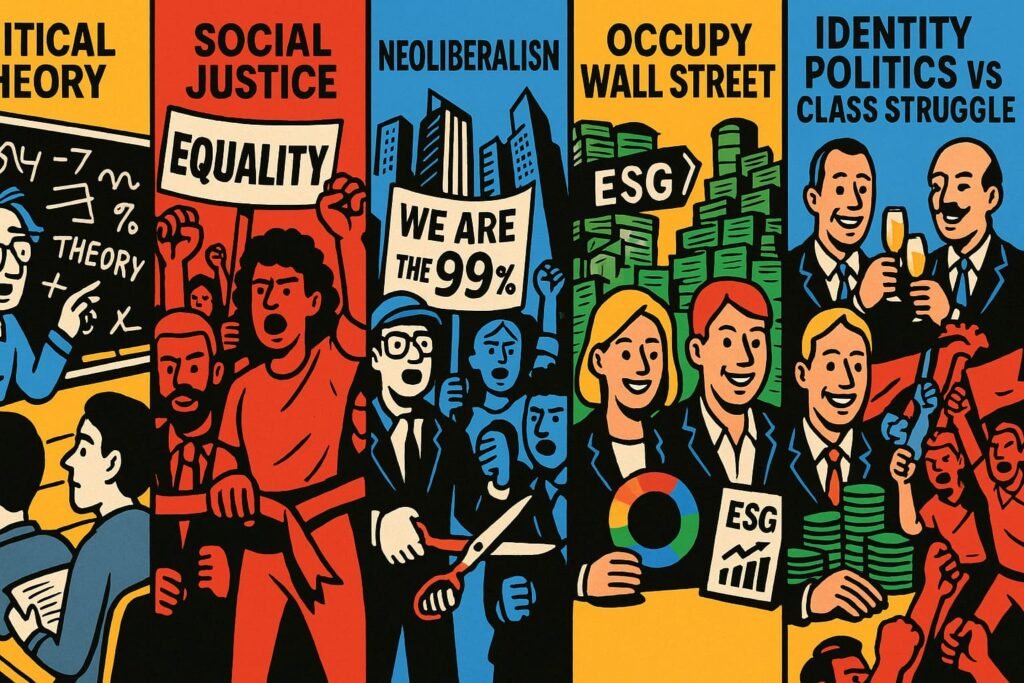Start Here: Woke Politics Explainer Series
What is Woke Politics?
Woke politics is the mix of activism, ideology, and power that claims to fight for justice — but often ends up dividing society, expanding bureaucracy, and giving corporations a new way to market themselves.
It didn’t appear overnight. Woke politics grew from decades of Critical Theory, campus activism, business interests, and political manoeuvring. Most people only see the culture wars — statues pulled down, pronouns debated, slogans shouted — without noticing the deeper forces at play.
That’s why we created the Woke Politics Explainer Series: a clear, no-nonsense guide to how woke ideas spread, who benefits from them, and how they shape everyday life. Each explainer cuts through the jargon and shows how theory became policy, and how slogans became business strategy.
👉 Here you’ll find the full set of Woke Politics explainers, grouped by category — from the academic roots to the corporate boardroom, and into everyday life.
🟢 Foundations – Where It All Began
The intellectual roots of woke politics lie in critical theory and postmodernism. These ideas questioned truth, power, and society — and laid the groundwork for today’s culture wars.
- Critical Theory – The Blueprint for Woke Politics
- Social Justice – From Fairness to Slogans
- Postmodernism – When Truth Became Optional
🔵 TurningPoints – The Economic & Political Shifts
Woke politics rose in the shadow of globalisation, financial crises, and shifting political strategies. These turning points created fertile ground for activism and identity politics to thrive.
- Globalisation & Financial Crises – When the World Was Sold Off
- Neoliberalism – Profit Above All Else
- Occupy Wall Street – The Protest That Backfired
🟡 Business – Woke Meets the Corporate World
Corporations discovered woke politics could be turned into strategy. Diversity pledges, rainbow logos, and ESG policies made activism profitable while keeping critics at bay.
- Corporate Branding – Virtue as a Marketing Strategy
- ESG – The Business of Virtue
- Big Tech & Censorship – The New Gatekeepers of Truth
🔴 Politics – Power, Policy & Institutions
Woke politics reshaped laws, education, and public life. From DEI offices to curriculum battles, ideology became policy — and politics turned into culture war.
- Culture Wars – Divide, Distract, Conquer
- DEI – Inclusion for Sale
- Education & Curriculum Changes – Indoctrination in the Classroom
🟣 Identity – Division Disguised as Empowerment
Woke politics replaced class struggle with identity struggle. Race, gender, and sexuality became the main battlefield — dividing society into tribes.
- Identity Politics – Division Disguised as Justice
- Intersectionality – Slicing Society into Tribes
- Class Struggle – The Forgotten Fight Over Wealth and Inequality
🟠 Impact – How It Hits Everyday Life
The impact of woke politics is felt daily — in HR policies, media narratives, and costs for small businesses. It’s not just theory; it shapes rules, culture, and money.
- HR Bureaucracy Explained – How Managers Stay Safe
- Media & Language Battles – Words as Weapons
- Costs for Small Business – Woke Rules, Big Burden
The Woke Politics Explainer Series is your guide to understanding how woke politics works — not just in protests or headlines, but in the systems of business, politics, and culture that surround us.
Read through the categories, follow the links, and see the bigger picture: a world where class inequality is hidden by culture wars, where corporations sell virtue, and where institutions enforce ideology.
Focus With our EXplainers Hubs
- For the bigger picture on how power really works? Visit our Politics of Power Explainer Hub to see how leaders, corporations, and ideologies battle for control.
- For the bigger picture of how corporations gained their power, visit The Power of Business & Corporations Explainer Hub.
- Want the full story on how virtue became a business model? Visit our ESG Explainer Hub to see how finance, branding, and compliance turned morality into a market.
- For a deeper understanding of Critical Theory, check out our Critical Theory Explainer Hub.
- Visit our Women & Biology Explainer Hub to see how law, sport, rights, and safeguarding all collide with ideology.
- Want the bigger picture? Explore our full Activism Explainer Hub to see how movements, tactics, and ideologies shape modern politics.
FAQ:
1. What are woke politics?
Woke politics are political and cultural movements rooted in identity, equity, and social justice rhetoric. In practice, they often replace debate with activism and shift focus from class inequality to identity categories.
2. Where did woke politics come from?
They trace back to academic theories such as Critical Theory and Postmodernism, which questioned truth, power, and identity. Over time, these ideas left the university and entered activism, politics, and corporate strategy.
3. Why are woke politics controversial?
Critics argue they create division, encourage censorship, and give corporations cover to look virtuous while avoiding real change. Supporters see them as progress towards fairness and inclusion.
4. How do woke politics affect daily life?
From workplace HR policies to school curricula and corporate branding, woke politics shape rules, language, and culture in ways most people encounter without realising the ideology behind them.
5. Who benefits from woke politics?
Institutions, corporations, and political actors often benefit most. While the language is about empowerment, the real winners are those who gain influence, legitimacy, and profit from promoting woke agendas.



